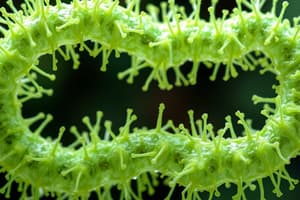Podcast
Questions and Answers
What is the meaning of the prefix 'bio'?
What is the meaning of the prefix 'bio'?
- Nature
- Life (correct)
- Study
- Environment
Which of the following is NOT a subfield of biology?
Which of the following is NOT a subfield of biology?
- Zoology
- Ecology
- Botany
- Psychology (correct)
What does bioinformatics primarily deal with?
What does bioinformatics primarily deal with?
- Biological information management (correct)
- Ecosystem restoration
- Animal behavior
- Plant breeding
What is the role of the biosphere?
What is the role of the biosphere?
Which concept describes the stability of internal conditions in organisms?
Which concept describes the stability of internal conditions in organisms?
In which field is the development of genetically modified organisms (GMOs) most relevant?
In which field is the development of genetically modified organisms (GMOs) most relevant?
What is the basic unit of life according to cell theory?
What is the basic unit of life according to cell theory?
Which term refers to the evolutionary history of a species?
Which term refers to the evolutionary history of a species?
Flashcards are hidden until you start studying
Study Notes
Overview of "Bio"
- Definition: "Bio" is a prefix that originates from the Greek word "bios," meaning life. It is used in various contexts related to living organisms.
Common Contexts
-
Biology:
- The scientific study of life and living organisms.
- Key subfields include:
- Zoology (animals)
- Botany (plants)
- Microbiology (microorganisms)
- Ecology (interactions of organisms and their environment)
-
Biographies:
- Accounts of a person's life.
- Often include major life events, achievements, and contributions.
-
Bioinformatics:
- The application of computer technology to manage biological information.
- Key for analyzing genomic data and understanding biological processes.
-
Biosphere:
- The global sum of all ecosystems.
- Encompasses regions of the surface, atmosphere, and hydrosphere occupied by living organisms.
-
Biotechnology:
- The use of biological systems or living organisms to develop products.
- Innovations include genetic engineering, pharmaceuticals, and agricultural enhancements.
Important Concepts
-
Cell Theory:
- All living organisms are made up of cells.
- The cell is the basic unit of life.
-
Genetics:
- Study of heredity and variation in organisms.
- Key components include DNA, genes, and chromosomes.
-
Evolution:
- Process through which species change over time.
- Natural selection drives adaptation and diversification.
-
Homeostasis:
- The ability of organisms to maintain stable internal conditions despite external changes.
Applications
-
Environmental Conservation:
- Understanding ecosystems and biodiversity to protect habitats.
-
Medicine:
- Innovations in treatments and therapies through biological research.
-
Agriculture:
- Development of genetically modified organisms (GMOs) for improved crop yield and resistance.
Key Terms
- Ecosystem: A biological community interacting with its physical environment.
- Microorganism: A microscopic organism, typically bacteria, viruses, or fungi.
- Phylogeny: The evolutionary history of a species or group of related species.
Study Tips
- Focus on key definitions and concepts.
- Use diagrams to visualize concepts like the cell structure and food webs.
- Relate biological concepts to real-world phenomena and applications.
- Utilize flashcards for memorizing terminology and significant figures in biology.
"Bio" Prefix
- "Bio" originates from the Greek word "bios," meaning life.
- It is used in various fields related to living organisms.
Biology
- The scientific study of life and living organisms.
- Includes subfields like zoology, botany, microbiology, and ecology.
Biographies
- Accounts of a person's life.
- Include key life events, achievements, and contributions.
Bioinformatics
- Application of computer technology to manage biological information.
- Used for analyzing genomic data and understanding biological processes.
Biosphere
- The global sum of all ecosystems.
- Includes regions of the surface, atmosphere, and hydrosphere occupied by living organisms.
Biotechnology
- The use of biological systems or living organisms to develop products.
- Includes genetic engineering, pharmaceuticals, and agricultural enhancements.
Cell Theory
- All living organisms are made up of cells.
- The cell is the basic unit of life.
Genetics
- The study of heredity and variation in organisms.
- Key concepts include DNA, genes, and chromosomes.
Evolution
- The process through which species change over time.
- Driven by natural selection, leading to adaptation and diversification.
Homeostasis
- The ability of organisms to maintain stable internal conditions despite external changes.
Applications of "Bio"
- Environmental Conservation:
- Understanding ecosystems and biodiversity to protect habitats.
- Medicine:
- Innovation in treatments and therapies through biological research.
- Agriculture:
- Development of GMOs for improved crop yield and resistance.
Key Terms
- Ecosystem: A biological community interacting with its physical environment.
- Microorganism: A microscopic organism like bacteria, viruses, or fungi.
- Phylogeny: The evolutionary history of a species or group of related species.
Studying That Suits You
Use AI to generate personalized quizzes and flashcards to suit your learning preferences.




